Please note TIG will be updating the Self-Advocacy Suite.
WI Transition Talks
Back to: TIG Podcasts
Join Brian Kenney, TIG Southern Regional Coordinator, and Stacy Duffy, CESA 2 Transition & Identification Specialist, as they discuss transition practices and interview educators, agency members, and community members to gather insights on programs and projects they are implementing within their districts.
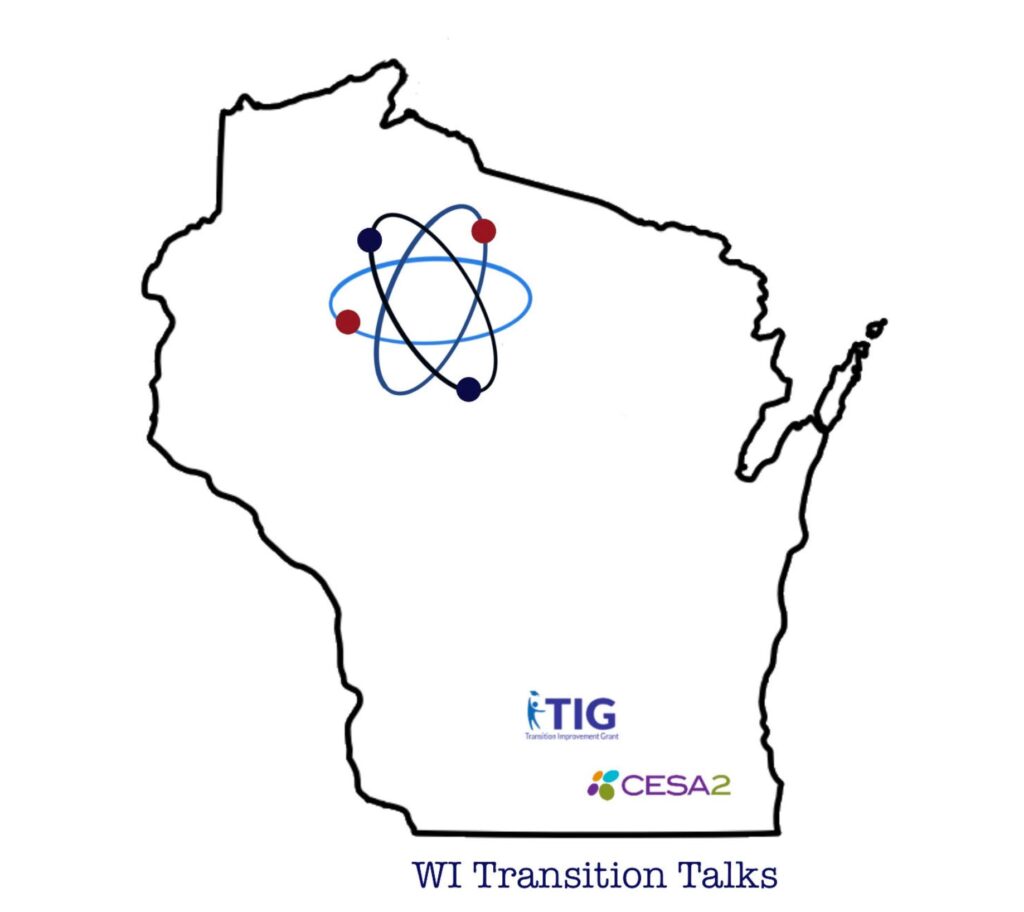
Youth Build and Redefining Readiness
Redefining readiness places a strong focus on ensuring all students graduate with stackable credentials: dual-credits, industry-recognized certifications, school-to-work enrollment, and co-curricular engagement especially in Career & Technical Skills Organizations (CTSO’s)
Supporting Documents

Post Covid Best Practices for Student Mental Health: Top Ten List for Returning to School Healthy and Strong
Sabrina shares her TOP 10 strategies for school districts to ensure they and equipped to proactively engage students in social and emotional learning and address mental health and well being
Supporting Documents

Promoting Inclusion Through Assistive Technology
This episode focuses on promoting inclusion and equity for all students through the use of assistive technology. We invited Anna Cliffe – Occupational Therapist and Assistive Technology Specialist for the Madison Metropolitan School District and Cassie Frost – Certified Assistive Technology Practitioner and an Educational Emotional and Behavioral Disabilities Specialist, working in the Stevens Point Area Public School District to share their insight into some great assistive technology practices.
Supporting Documents

Postsecondary Transition Planning – Building Capacity for Youth Apprenticeships & Registered Adult Apprenticeships
The journey to career and life readiness for many students with disabilities can be enhanced when there is meaningful participation in the Youth Apprenticeship Program (YA). On today’s podcast, Josh Johnson is going to explain the importance of making those connections for students along with the crucial steps of preparing students to bridge that YA with a Registered Adult Apprenticeship (RA). Josh will discuss the labor market demands in Wisconsin and the need for students to prepare for high wage, high skills jobs while they are in high school.

Transition Programming Beyond Age 18
The Beyond Age 18 guidance/website is designed to help teams create meaningful, individualized special education services for students with IEPs who stay in high school after their peers graduate. For some students with IEPs, this time may be used to finish credits towards graduation with a regular high school diploma while others may build skills as they transition to life after high school, and for some, it’s both. This guidance is provided to help teams reflect on what supports are needed and where, as well as connecting with outside agencies and braiding services to improve post school outcomes for students with IEPs.
Supporting Documents

Beyond Age 18
The journey to career and life readiness for many students with disabilities can be enhanced when there is meaningful participation in the Youth Apprenticeship Program (YA). On today’s podcast, Josh Johnson is going to explain the importance of making those connections for students along with the crucial steps of preparing students to bridge that YA with a Registered Adult Apprenticeship (RA). Josh will discuss the labor market demands in Wisconsin and the need for students to prepare for high wage, high skills jobs while they are in high school.
Supporting Documents

Rural CCoT – Best Practices
County Communities on Transition (CCoT’s) are a group of stakeholders who have made the commitment to collaborate around identifying barriers to transition planning, organizing needed supports, and developing solutions for youth with disabilities in the local county they serve. Today you will hear from Justin Leonard, who helps facilitate the Iowa, Lafayette & Grant County CCoT. Justin will share some of the best practices their CCoT team engages in to keep great productivity and center their group around increasing youth outcomes.
Supporting Documents

Suburban and Urban CCoT Best Practices
County Communities on Transition (CCoT’s) are a group of stakeholders who have made the commitment to collaborate around identifying barriers to transition planning, organizing needed supports, and developing solutions for youth with disabilities in the local county they serve. Today you will hear from Megan Rindal, who helps facilitate Waukesha County’s team . Megan will share some of the best practices their CCoT team engages in to keep great productivity and center their group around increasing youth outcomes.

Transition Health Care Conversations
Health care transition in respect to adolescent to adult systems is a very important topic related to both the IEP and the PTP. Bringing health care into all aspects of transition conversations helps begin meaningful activities to prepare youth for the next steps when it comes to understanding health care. Tim Markle will share some great ideas for IEP teams as well as great WI and National level resources related to health care conversations.

Weaving Financial Planning into the Postsecondary Transition Process
Financial planning discussions can be very important conversations for parents to have with the IEP team. Joe Dettwiller will share best practices from his years of experience working collaboratively with families as they plan for financial security and independence for their young adult with a disability.
Supporting Documents
*The TIG does not endorse any products associated with this podcast.
Joel Dettwiler Podcast: https://open.spotify.com/show/0O9LDbmUrolNAc9f093lgc?si=d078627ab1f4454d
Quantum Group Youtube: https://www.youtube.com/channel/UCPQApaLQcwL6nd2Pc7xQMzg
Quantum Group Facebook: https://www.facebook.com/QuantumGroupPlanners/
Quantum Group Website: www.quantumplanners.com

How Apprenticeship Navigators Can Connect Secondary Students to Registered Adult Apprenticeships
Wisconsin’s Registered Adult Apprenticeship (RA) Program now has Apprenticeship Navigators to help guide secondary school youth to engage in the RA program. The Navigators are assigned to regions across Wisconsin and they engage youth through phone and email contact as well as attending IEP meetings when it is feasible. Today we are connecting with Jeff Kennedy who represents the Central and Southwestern regions of WI.

Career Readiness and Postsecondary Transition
Career Readiness and Career Learning are important aspects of the overall ability of a student to become career, community, and life ready. Karin Smith will share some great resources and insight into the importance of connecting career readiness concepts to the Postsecondary Transition Plan (PTP).

Hayward School District – Freshman Success Program (Equity in Achieving Increased Youth Outcomes for Students with Disabilities)
Hayward school district has been really engaged in increasing outcomes for students transitioning from middle school to HS. They have created a course within their district called Freshmen Success. The class is focused on building a mentor-mentee relationship between youth and adults within the building. Today we will be collaborating with Dr. Laura Kieran who is the Director of Special Education and Cathy Larson who is a Teacher at Hayward.
Supporting Documents

Tools to Support Inclusion
Joining us today is Kathy White to talk about ways we can support inclusive practices both in the classroom and in the community, utilizing assistive technology. Kathy White is a recently retired Assistive Technology Specialist. She worked for the School District of Janesville for 33 years, where she directed the program, and provided technology solutions for students with disabilities (ages 3-21).

Career Based and Work-Based Learning Experiences
Today Karin Smith from the Wisconsin Dept of Public Instruction will be joining us to discuss the crucial components of both Career Based Learning Experiences (CBLE’s) and Work Based Learning Experiences (WBLE’s). Karin will discuss the importance of students with disabilities having early and frequent participation in these valuable opportunities to develop career awareness and career readiness skills.

Early Warning Systems and Opportunity for Schools to Utilize Data to Increase Youth Outcomes
Today Jennifer Hilgendorf will give us an overview of the WI Dropout Early Warning System (DEWS) and explain what this data means to school districts in relation to potential student outcomes.
Supporting Documents

Creating Inclusive Practices in the Classroom and Community Utilizing Universal Design for Learning (UDL)
Melissa Emler will provide us with a detailed framework of Universal Design for Instruction (UDL). UDL provides a best practice learning environment that allows for all youth to be lifelong learners and thrive.
Supporting Documents

Understanding Disability Benefits Age 18 and Beyond
In today’s episode we will be talking with Quinn Hause & Jim Pritzkow, both with Sauk County ADRC (Eagle Country ADRC). Quinn is a Disability Benefit Specialist (DBS), and Jim is an Information and Assistance Specialist. They will discuss the 3 key areas that ADRC’s focus on with youth related to transition planning for life after age 18 – Transition they focus on three key areas: Legal Decision Making, Social Security Disability and the Long Term Care Programs.
Supporting Documents

Transitioning from Secondary to Postsecondary – Wisconsin Technical College System & UW System
Deb Gilster, Disability Services Coordinator from Blackhawk Technical College in Janesville, WI joins us to discuss the important differences between secondary and postsecondary education and training. Deb will be focusing the conversation on IDEA vs ADA and some of the common examples of accommodations that are likely acceptable within many postsecondary education and training programs.
Supporting Documents


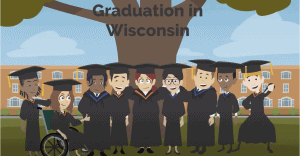

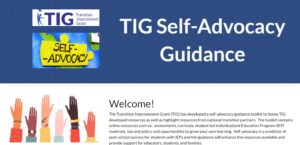 TIG Self-Advocacy Guidance Google Site
TIG Self-Advocacy Guidance Google Site 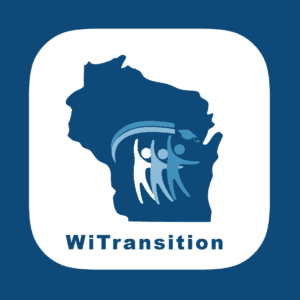
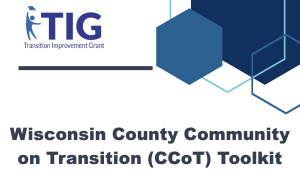 Wisconsin County Community on Transition (CCoT) Toolkit
Wisconsin County Community on Transition (CCoT) Toolkit